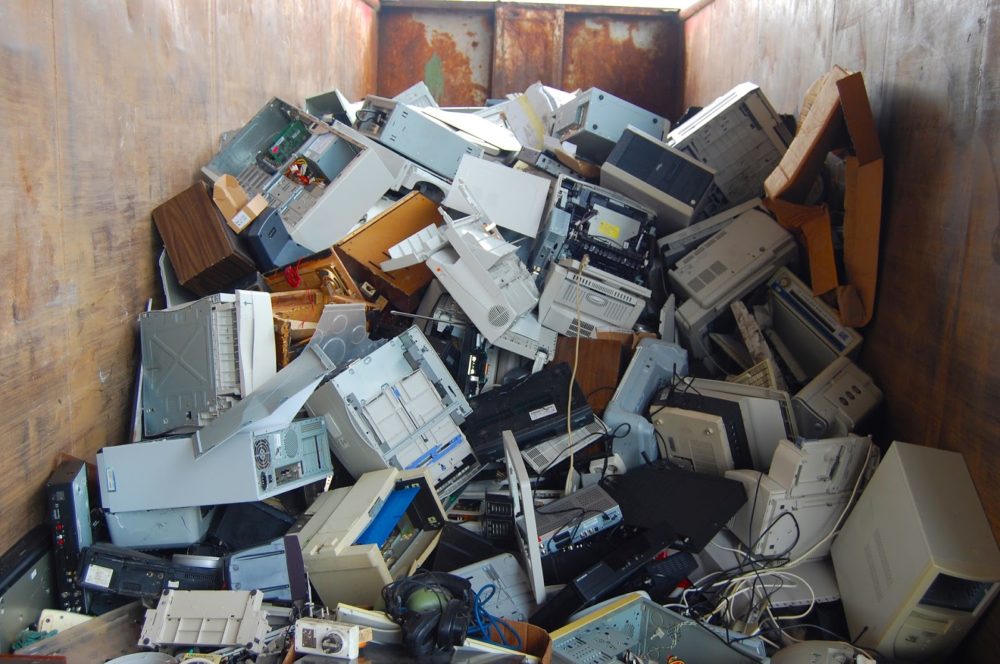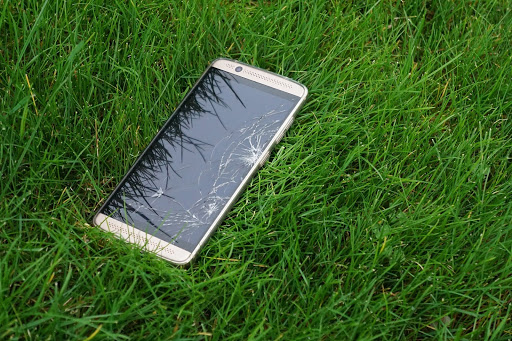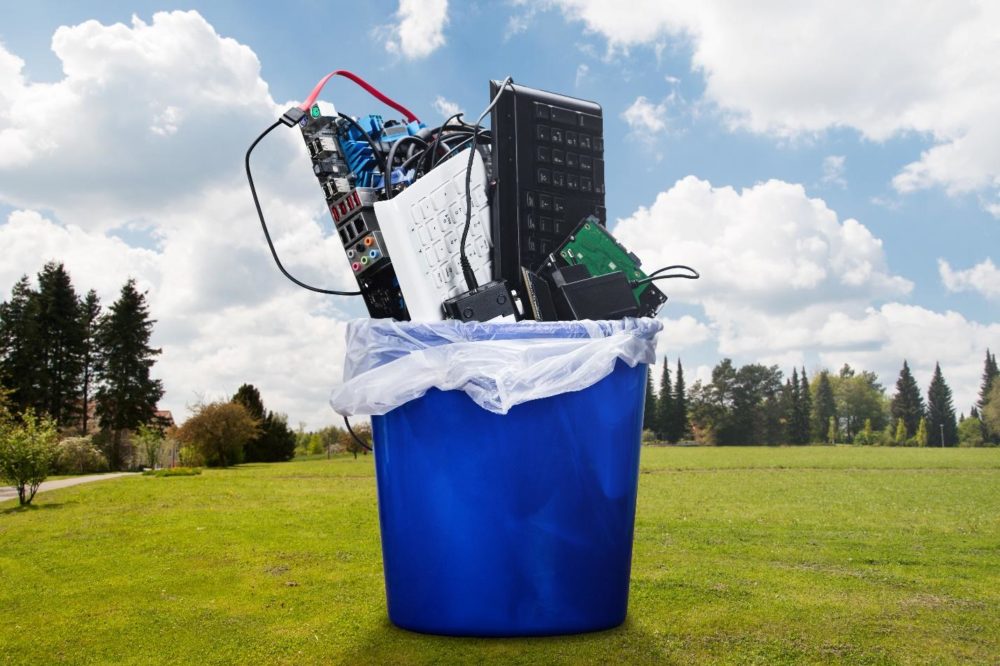Is it illegal to throw away electronics? Is it illegal to throw away computers? As a consumer, chances are you’ve thought this question before. The answer is not as nuanced as you may think.
If you’re like a lot of consumers, chances are you replace your electronics every few years. While some people toss their old smartphone in a desk drawer or closet, other people choose to put their electronics in the trash.
But did you know that depending on where you live, that throwing away your electronics might be illegal? How to dispose of old computers properly is something businesses and consumers should be aware of, but the information out there is so scant.
A lot of people may not realize it, but a growing number of states – including some of the nation’s largest states, like California, Illinois, New York, and North Carolina – have added electronics to the list of items that are banned from going into landfills.
But even if your state doesn’t specifically prohibit electronics from ending up in the trash, it’s essential to continue educating all Americans about the need to recycle their used electronics rather than throwing them out.
Electronics are a toxic addition to our landfills, posing serious environmental risks.
So the solution starts with getting that message out – as well as people taking the time to research what their own community requires them to do with their unwanted electronics.
Is it Illegal to Throw Away Computers?
Computers and mobile devices are constantly becoming obsolete. With so many new devices flooding the markets, what do we do with all of these older devices? That’s not to mention tablets, desktops, and laptops. Technology is advancing rapidly. Each year we generate around 40 million tons of electronic waste worldwide. That’s like throwing away over 69 million laptops a day. That’s why it’s so important to ensure that the waste we generate does not end up in landfills. Especially since it may be illegal.
Everybody knows that a lot of states ban certain items from landfills. Common items include car batteries, medical waste, motor oil, and paint, for example.
For those who do have those types of wastes to be disposed of, there are usually alternative means of getting rid of them. Car batteries and used motor oil, for example, can be taken to most AutoZones stores, which also accept used transmission fluid and gear oil.
But now a growing number of states are also adding used electronics to the list of items that are banned from going into landfills – and making sure that rule gets enforced.
However, it’s also important to note that some states do make it illegal to dispose of electronics, including California.
The Golden State has a lengthy list of items that can’t go into landfills, including cars, computers, medical needles, mercury thermostats, appliances, and NiCad batteries. Electronics are on the list as well, and that includes laptops, monitors and printers.
And California enforces the law. Target Superstore had to pay the state millions in fines for throwing out items containing hazardous materials, such as electronics.
New York is another example.
On Jan. 1 2015, New York made it illegal to throw out electronics, from smartphones to iPhone chargers. Until then, the law had allowed New Yorkers to fling those items out onto the curb, but with the passage of the new law, that practice came to an end.
How was the law enforced?
The law included an enforcement mechanism: a $100 fine for anyone who got caught doing otherwise.
Illinois passed the Recycling and Reuse Act in 2011, making it illegal to throw out more than 13 electronic products. This law was aimed at promoting the best use possible for the fast-growing amount of electronic waste.
Anyone ready to get rid of their computer, printer, old keyboard or DVD players no longer had the option of tossing it out with their regular trash.
The list also included computer mouses, portable music players, and other electronic parts and supplies.
In Illinois, the law states that anyone who gets caught throwing out those devices faces a first-time fine of $25.
The law also contains requirements for electronics manufacturers: they’re mandated to collect a volume of electronic waste proportionate to what they sell as an “extended producer responsibility.” If they don’t meet this requirement, they’ll need to pay more.
Connecticut, Indiana, New Hampshire and Vermont are also among the states that ban electronics from trash bins.
Why Are These States Banning Electrics in Trash?

Is it illegal to throw away computers? How to dispose of a computer can be confusing, but if you find the right electronics recycler, it doesn’t have to be. A big challenge these states are trying to address is that consumers are replacing their electronics far more frequently. So the amount of e-waste being generated keeps skyrocketing.
Gone are the days when consumers bought a computer, laptop or cell phone and then held on to it for a decade or more.
But the fact that these electronics are being replaced more often doesn’t mean they qualify as “junk.” A lot of the devices that consumers are replacing still work fine. It’s only that the newest, more technologically advanced versions have made them seem obsolete.
And even the devices that are broken and can’t be repaired still have valuable items with them that can be brought to a recycling firm like Great Lakes Electronics Corporation, where they can be separated out and reused.
Those items can include metals like gold, silver, copper, and platinum, which can still be reused by manufacturers. Internationally, only 10-15 percent of the gold in e-waste gets successfully recovered, while the rest is lost.
And the United Nations reports that electronic waste contains deposits of precious metal estimated to be 50 times richer than ores mined from the earth.
Cellphones are a “Gold Mine”

Cell phones, in particular, are considered a “gold mine.” The Environmental Protection Agency estimates that if one million smartphones get recycled, 75 pounds of gold, 772 pounds of silver, 33 pounds of palladium and more than 35,000 pounds of copper can get reused.
That means that for every million smartphones that are tossed away, 75 pounds of gold and other precious metals are lost. That’s a lot of lost revenue.
Only a small percentage of cell phones get recycled. Many of them are most likely gathering dust in drawers or ending up in the trash can.
And they certainly have no value sitting in a landfill.
The Average Consumer Owns a Plethora of Electronics
The Consumer Technology Association noted in 2013 that the average American household owned 24 consumer electronics products. The EPA reports these products are the fastest-growing component of what Americans throw out.
And while some states emphasize the risks to the environment from throwing away e-waste, other states stress the fact that these devices still have value. Oregon, for example, has a statewide program called Oregon E-Cycles, funded by manufacturers to provide safe recycling of a range of electronics.
And recycling is also important for another reason: any personal information stored on your cell phone, laptop or computer stays on that device once you decide you no longer want it. And that’s exactly what thieves and those who engage in identity scams are hoping for.
On the other hand, recycling firms like Great Lakes Electronics Corporation can wipe your personal data from any devices, making it safer for you once you decide to get rid of it.
Why Is Recycling Important to Our Environment?
In fact, the parts contained within e-waste truly can’t be considered as waste or garbage.
But the toxic chemicals within those devices is also something we all want to keep out of landfills.
As the amount of used electronics being thrown out keeps increasing, there’s a very strong need to increase recycling rates for e-waste. Electronics Recycling is important for several reasons.
It’s important for Solid Waste Management, since the explosive growth in the consumer electronics industry and shortened product lifecycle for these devices has led to a rapid escalation in the amount of e-waste being generated. These old electronic devices contain toxic substances that include lead, mercury, cadmium and chromium.
If these toxic substances get placed in a landfill, those chemicals can seep into the soil and water and pose serious health risks to people and to wildlife.
This is why states have started to focus their efforts on preventing that from happening and really began to enforce bans on throwing away electronics or putting electronics in the trash.
The preferred solution to these concerns and issues is recycling, since the proper processing of used electronics helps ensure these materials don’t get released into the environment.
How Can Consumers Recycle Their E-Waste?
Far too often, consumers who are comfortable recycling cans, bottles, newspapers and other items in their municipal recycling bin simply don’t know what to do with their old computers, smartphones or other electronic devices. Some people leave those small devices stored in a closet or desk drawer, while others assume they can safely be thrown out.
And while environmental groups continue to look for ways to educate consumers about the importance of recycling their e-waste, a growing number of states are taking steps to make sure e-waste doesn’t continue to be a landfill problem.
And the message they’re trying to convey is that a much safer and smarter bet is to enlist the use of recyclers who are certified and established to ensure responsible recycling. In fact, 25 states have mandated electronics recycling, and those states represent 65 percent of the American population.
And even if you don’t live in one of the states that specifically bans e-waste from going out with your regular curbside trash, check your local laws. Some cities and counties have their own policies that ban e-waste, even if there’s no statewide ban.
Conclusion: Is it Illegal to Throw Away Electronics?
It’s important to keep reinforcing the message that tossing out electronics instead of recycling them does a lot of harm to our health and our environment. Even if your state doesn’t specifically prohibit you from throwing away electronics or putting electronics in the trash, recycling them is the right thing to do.
The solution is to turn those devices over to an experienced firm like Great Lakes Electronics Corporation, which has years of experience performing environmentally friendly recycling of electronic products.
The team at Great Lakes Electronics Corporation will disassemble these items into component parts, and the ones that still have value can be sold for reuse. Other parts are used for metal recovery.
Everything within your devices gets recycled.
To learn more, contact Great Lakes Electronics Corporation at 888-392-7831 or fill out our contact form online today.

